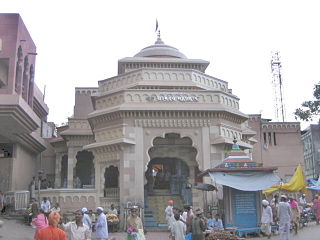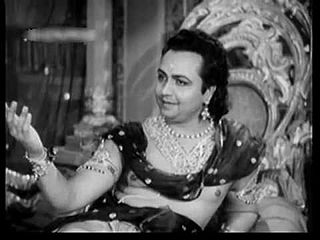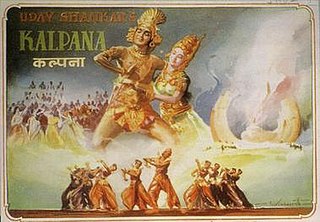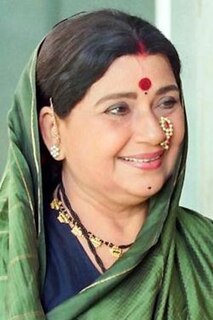
Padmini, also known as Padmavati, was a legendary 13th–14th century queen (Rani) of the Mewar kingdom of present-day India. Several 16th-century texts mention her, of which the earliest source is Padmavat, an epic fictionalized poem written by Malik Muhammad Jayasi in 1540 CE.

Prem Rog is a 1982 Bollywood romantic film directed by Raj Kapoor. The film tells the story of a man's love towards a woman who is a widow and of a higher status. The film is considered a classic work by the director Raj Kapoor. Raj Kapoor returned to social themes with this film. The film earned high critical acclaim. The screenplay was written by Jainendra Jain and Kamna Chandra.

Bedara Kannappa is a 1954 Indian Kannada film directed by H. L. N. Simha and written by G. V. Iyer. It stars Rajkumar and Pandari Bai in lead roles. Bedara Kannappa started as a play produced by the Gubbi Veeranna Nataka Company before it became a Kannada film. The release was a historic moment for the Kannada cinema industry causing its production of films to increase over the next ten years. The film was a launch pad to Rajkumar's career. It marked the debut of Narasimharaju, who went on to be named among Kannada cinema's finest actors, alongside Rajkumar.

Jhanak Jhanak Payal Baaje is a 1955 Bollywood film directed by V. Shantaram. It stars Shantaram's wife Sandhya and dancer Gopi Krishna in lead roles. One of the earlier Technicolor films made in India, the film won the All India Certificate of Merit for Best Feature Film, the National Film Award for Best Feature Film in Hindi, and the Filmfare Best Movie Award. The film was declared a "Super Hit" at Box office India.

Mahatma Gandhi Kashi Vidyapith is a public university located in Varanasi or Benaras, Uttar Pradesh, India. Established in 1921 as Kashi Vidyapith and later renamed, it is administered under the state legislature of the government of Uttar Pradesh. The university has more than 400+ affiliated colleges spread over six districts. It is one of the largest state universities in Uttar Pradesh, with hundreds of thousands of students, both rural and urban. It offers a range of professional and academic courses in arts, science, commerce, law, computing and management.

Uran Khatola is a 1955 Hindi romantic drama movie produced by music director Naushad and directed by S.U. Sunny. The film stars Dilip Kumar, Nimmi, Jeevan and Tun Tun. The film's music was rendered by Naushad. Songs are written by Shakeel Badayuni. "O dur ke musaafir ham ko bhi saath le le re" song is from this film.

Ghatak: Lethal is an Indian 1996 Hindi-language action thriller film directed by Rajkumar Santoshi, starring Sunny Deol, Meenakshi Seshadri, and Amrish Puri, while Danny Denzongpa plays the antagonist. Marking Santoshi's third collaboration with Deol, Seshadri, and Puri after Ghayal (1990) and Damini (1993), it earned ₹440 million worldwide to become the fourth highest-grossing Bollywood film of the year, and won three awards including Best Supporting Actor for Puri at the 42nd Filmfare Awards, where it was also nominated for three other awards: Best Director for Santoshi, Best Actor for Deol, and Best Villain for Denzongpa. Ghatak is Seshadri's last film to date.

Shakila was Indian actress, best known for her roles in Guru Dutt's films: Aar Paar (1954) and C.I.D. (1956).

The Vithoba Temple, Pandharpur, officially known as Shri Vitthal-Rukmini Mandir, is a Hindu temple in Pandharpur in the Indian state of Maharashtra. It is the main centre of worship for Vithoba, a form of the god Vishnu or Krishna, and his consort Rakhumai. It is the most visited temple in Maharashtra. The Warkaris start marching from their homes to the temple of Pandharpur in groups called Dindi (procession) to reach on Aashadhi Ekadashi and Kartiki Ekadashi. A dip in the holy river Chandrabhaga, on whose banks Pandharpur resides, is believed to have power to wash all sins. All the devotees are allowed to touch the feet of the idol of Vithoba. In May 2014, the temple became the first in India to invite women and people from backward classes as priests.
Prahlada was a king, the son of Hiranyakashipu and Kayadhu, and the father of Virochana. He belonged to the Kashyap gotra. He is described as a saintly boy from the Puranas known for his piety and bhakti to Lord Vishnu. Despite the abusive nature of his father, Hiranyakashipu, he continued his devotion towards Lord Vishnu. He is considered to be a mahājana, or great devotee, by followers of Vaishnava traditions and is of special importance to devotees of the avatār Narasimha. A treatise is accredited to him in the Bhagavata Purana in which Prahlāda describes the process of loving worship to his Lord Vishnu. The majority of stories in the Puranas are based on the activities of Prahlāda as a young boy, and he is usually depicted as such in paintings and illustrations.

Bhakta Kuchela , dubbed into Hindi as Krishna Bhakta Sudama is a 1961 Malayalam mythological film, directed by P. Subramaniam, based on the Tamil film of the same name, which itself is based on the story of the friendship of the Hindu god Krishna with a poor Brahmin named Kuchela a.k.a. Sudama. The film was an unusual collaboration between a Malayalam producer and an array of Telugu and Tamil film stars. The key roles were handled by Telugu actors. The success of this film encouraged Malayalam producers to invite Telugu and Tamil stars, noted for their mythological roles, to act in their films of similar themes.

Mangaiyar Thilakam is a 1955 Indian Tamil-language drama film directed by L. V. Prasad. The film was produced by Sripadhashankar under Vaidya films and stars Sivaji Ganesan and Padmini in the lead roles, while M. N. Rajam, S. V. Subbiah, K. A. Thangavelu and K. Sarangapani play pivotal roles. The film's soundtrack and background score were composed by S. Dakshinamurthi, while the lyrics for the songs were written by Kannadasan, Puratchidasan and Maruthakasi.
Rathnagiri Rahasya is a 1957 Kannada language mystery – adventure – fantasy film, directed and produced by B. R. Panthulu, starring Udaykumar and Jamuna in the lead roles. The film was made simultaneously in Tamil language as Thangamalai Ragasiyam, released in the same year, with Sivaji Ganesan in the lead, along with Jamuna reprising her role. Most of the technical crew remained the same for both Tamil and Kannada versions. It was also dubbed into Telugu as Rathnagiri Rahasyam and dubbed in Hindi as Suhaag. Future acclaimed director Puttanna Kanagal made his debut as an assistant director in this film. This film screened at IFFI 1992 B. R. Panthalu Homage section. Video clips of some songs in this film such as Kalyana Namma, Oh Raja Maharaja and more were shot in Gevacolor.

Mudhal Thethi in Tamil, Modala Thedi in Kannada is an Indian bilingual film, directed by P. Neelakantan and produced by B. R. Panthulu. This was the first film produced by Panthulu under "Padmini Pictures" banner. The Tamil version starred Sivaji Ganesan, Anjali Devi, N. S. Krishnan and T. A. Madhuram in lead roles. The film had musical score by T. G. Lingappa scoring for his first feature film. The film was a remake of Hindi film Paheli Tarikh (1954).
S. N. Tripathi also known as Shri Nath Tripathi was an Indian composer, whose active years were from the 1930s to the 1980s. Tripathi's multi-faceted work range included being a composer, writer, actor, and director of films. His debut film as an independent composer was Chandan (1942). He was the first composer to make use of the slogan "Jai Hind" in a song in films, during the end of the British Raj. The song was "Jai Hind, Jai Hind, Jai Hind, Yeh Hind Ki Kahaniyan" from the film Mansarovar (1946). He gained popularity as an actor when he started playing the role of Hanuman in mythological and religious films like Homi Wadia's Hanuman Pataal Vijay (1951).

Manoos, also called Life's for Living, is a 1939 Indian Marathi social melodrama film directed by V. Shantaram. The movie was simultaneously made in Hindi as Aadmi. The film was based on a short story called "The Police Constable". The story was by A. Bhaskarrao, with screenplay and dialogue by Anant Kanekar. The cinematographer was V. Avadhoot and the music was composed by Master Krishna Rao, with lyrics by Kanekar. The cast included Shahu Modak, Shanta Hublikar, Sundara Bai, Ram Marathe, Narmada, Ganpatrao and Raja Paranjpe.

Thirumagal is a 1971 Tamil-language drama film, directed by T. R. Raghunath and produced by C. K. Govindarajalu under his productions, Govindarajan Films. The film screenplay and dialogue were written by C. K. Govindarajalu and the story was written by Aarur Doss respectively. Music was by K. V. Mahadevan. It stars Lakshmi in the major role, with Gemini Ganesan, A. V. M. Rajan, Padmini and Major Sundararajan playing pivotal role.
Bhakta Markandeya is an Indian Tamil language mythological film directed by B. S. Ranga with Chittor V. Nagaiah, Pushpavalli, K. A. Thangavelu and Padmini Priyadarshini in the lead roles. The film was released in 1957.
Vikram Betaal Ki Rahasya Gatha is a mythological serial created by Peninsula Pictures based on Baital Pachisi. The series has aired on &TV and digitally on ZEE5 platform, starring Aham Sharma and Aayam Mehta in lead roles.
Hitesh Modak is a music composer, arranger and producer from Mumbai. He is the arranger and music producer of the track Moh Moh Ke Dhaage from Dum Lagake Haisa.

















